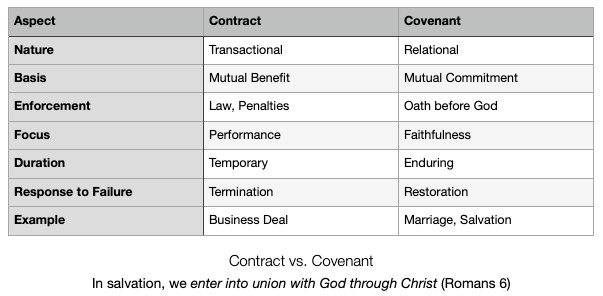If there’s one word that captures the heartbeat of the gospel, it’s grace. Yet few words are more misunderstood. Some imagine grace as a kind of lenient contract, i.e., a divine deal that lets us break the rules without consequence. Others see it as a contract we must keep to the letter to stay on God’s good side. Both miss the beauty of what God actually offers.
Grace is not contractual. It’s covenantal.
Contracts Protect Interests. Covenants Transform Hearts.
A contract says, “If you do this, I’ll do that.” It’s built on performance and protection. A covenant, however, says, “I am yours, and I will be faithful, even when you are not.” It’s rooted in commitment and love.
Here’s a table that might help us better understand the difference between a covenant and a contract:
When God established His covenant with Abraham, He wasn’t making a deal; He was revealing His heart. In Genesis 15, God commanded Abraham to prepare a sacrifice by cutting several animals in half and arranging the pieces opposite each other, a common ancient ritual for sealing a covenant. Normally, both parties would walk between the pieces to show they accepted the terms.
But then something else happened.
“As the sun was setting, a deep sleep came over Abram... When the sun had set and it was dark, a smoking fire pot and a flaming torch appeared and passed between the divided animals. On that day the LORD made a covenant with Abram.”
— Genesis 15:12, 17-18
Abraham was asleep. God walked alone.
The message was unmistakable: this covenant did not depend on Abraham’s faithfulness; it depended on God’s. Grace has always worked that way. Salvation isn’t our pledge to keep up our end of a bargain; it’s God’s unbreakable promise to redeem those who trust Him.
In Genesis 17, God confirmed His covenant with Abraham. He gave it a physical sign: circumcision. Abram’s name was changed to Abraham (“father of many nations”), and the promise was tied to an everlasting relationship. He didn’t invite Abraham to negotiate. Instead, He made a promise grounded in His own character:
“I will establish my covenant between me and you and your offspring after you … to be your God and the God of your offspring after you.”
— Genesis 17:7
See the relational nature of this covenant - it’s not just about blessings, but belonging. “I will be your God and you will be my people.”
Later, Israel would break that covenant time and again, yet God’s faithfulness never wavered. He declared through Jeremiah:
“I will make a new covenant … not like the covenant I made with their ancestors… I will put my teaching within them and write it on their hearts. I will be their God, and they will be my people.”
— Jeremiah 31:31–33
God’s covenant is always about relationship, not transaction. When He sent Jesus, He sealed that promise with His own blood; the ultimate covenant oath (Luke 22:20). Grace, then, is not God lowering the bar. It’s God binding Himself to us in love, even at the cost of His own Son.
Grace Doesn’t Cancel Commitment — It Redefines It
Some fear that emphasizing grace weakens obedience. But the opposite is true.
Contracts rely on obligation. Covenants inspire devotion.
Paul wrote in Romans 6:
“How can we who died to sin still live in it? … We were buried with him by baptism into death, in order that, just as Christ was raised from the dead … we too may walk in newness of life.”
— Romans 6:2-4
Grace doesn’t give permission to sin. It gives power to live differently.
When we understand grace, we stop obeying to earn favor and start obeying because we’ve been transformed by love.
That’s why Paul could also write:
“The grace of God has appeared, bringing salvation for all people, instructing us to deny godlessness and worldly lusts and to live in a sensible, righteous, and godly way in the present age.”
— Titus 2:11-12
Grace doesn’t remove the call to holiness. It fuels it. It doesn’t replace commitment. Instead, it redefines it through relationship with Christ.
Grace Calls Us to Faithfulness, Not Fear
Under a contract, fear keeps people in line. Under a covenant, love keeps people faithful. John wrote:
“There is no fear in love; instead, perfect love drives out fear.”
— 1 John 4:18
When we see God only through the lens of performance, fear rules our hearts.
But when we understand His covenant grace —His steadfast love that does not fail —faith begins to flourish.
Paul writes in Romans 8 that this covenant relationship is unbreakable:
“Who can separate us from the love of Christ? … Neither death nor life, nor angels nor rulers … nor anything else in all creation will be able to separate us from the love of God that is in Christ Jesus our Lord.”
— Romans 8:35-39
That’s the confidence grace gives, not arrogance, but assurance. We’re not anxiously trying to maintain a contract; we’re joyfully living out a covenant sealed in blood.
Living the Covenant Life
So, what does this mean for us?
It means the Christian life isn’t a business deal. It’s a relationship of love.
It means when we stumble, we don’t run from God; we run to Him, trusting the covenant sealed at the cross. And it means obedience flows not from fear of rejection but from gratitude for redemption. Grace is not a loophole. It’s a lifeline.
It’s not a deal we negotiate; it’s a relationship we receive.
“He remains faithful, for He cannot deny Himself.”
— 2 Timothy 2:13
And once we understand that, fear loses its power and faith takes its place.






Brother Allen, where do you come up with all these articles on Grace? You are a breath of fresh air when it comes to brotherhood material. I have been an advocate of God's Grace ever since I became a Christian in 1980, but it was not embraced. Not a lot of brotherhood material is written, Not a lot of lectures I listen to deal with it. Why? Because with out it we would be lost as lost can be. keep up the awesome work. God bless
Where is repentance found in this covenant? Is there such a thing as a conditional promise relating to grace?